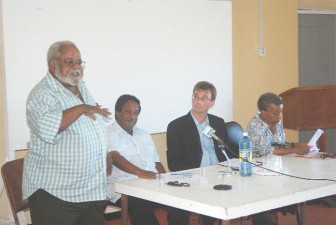Widening the trade union base to include various groups of currently unorganised workers could be the key to bridging the racial and political divide pervasive in the local labour movement, social activist Andaiye believes.
Speaking at a forum on labour yesterday organised by the University of Guyana (UG) Students for Social Change, Andaiye said that such a move would also help to guard against the exploitation that many of these workers are regularly subjected to. She noted too that many of the workers that fall into this category are women.

Andaiye, who was representing Red Thread at the event, said that the unions had turned their backs on this important section of the workforce. “The weakness of the labour movement tends always to be discussed, in terms of…divided on the grounds of race and divided on the grounds of party. And that’s true,” she said. She added, however, that “there is a capital-defined definition of labour by which we are operating, which means that we are going to exclude thousands upon thousands of our women, particularly women with the lowest income.” She identified domestics, market vendors, security guards and housewives as among the categories of workers which belong to this group.
While acknowledging that the unions need to address the racial and party divisions that exist in the labour movement, Andaiye pointed out that the persons belonging to the unorganised workers come from all races and are of different political persuasions. She suggested that reaching out to these groups could help bridge the existing divide.
The idea of organising these various categories of workers, Andaiye said, was not a novel one and had been done before in the Caribbean. She told the gathering of mostly university students that Trinidad had employed such systems during the 1940s.
The social activist also said that the housework and the care giving that many women also do is work that has both social and economic value. These activities, she said, result in the production and reproduction of the labour force.
Andaiye said that the existing economic structure in the country allows for the creation of jobs that are “super exploitative.” She cited examples where security guards often find themselves working two successive 12-hour shifts and cases where mothers are working in locations far away from their children. This, she said, had a lot of social spin offs. “If you oblige people who are parents, if you oblige, above all, mothers to work in that way, you must know that those people are not paying a great deal of attention to their children. What they are doing is neglecting their children, in order to make a living. And then the whole society bears the result of that,” she said.
“Only piece of the issue is ever being discussed. If you have a majority of the labour force that is, in fact, unorganised, large numbers of them in an informal sector and so on then all of those issues that are informal sector issues, those are not even coming up anywhere on the agenda, although they are crucial issues,” Andaiye told this newspaper when she was approached after the forum.
Expounding on why the unions should push this issue, Andaiye said “not only would you be increasing in numbers but you are bringing fundamental issues about the economy and the society into the struggle you’re supposed to be waging for betterment for all workers.”
“It will at least allow them [the workers], in an organized way, to put their issues centrally on the table,” she said. According to her, the system that currently exists allows for much absurdity. Citing an example using market vendors, Andaiye said “(Minister of Works) Robeson Benn can break down the stands, then the President can come and give them back the stands and they say `yes Mister President, thank you very much’ and so on.”
According to her, when people examine this situation, it is not even about race. “Now if people look properly at the vendors they will see that it is not even about race,” she said. “I insist that many of these sectors cross races because they are always moving vendors at Parika…all over the place, that’s how they treat vendors,” she said. Vendors, she said, “are now not only a key part of this economy, a key part of the distribution of not only foodstuff but other goods and so on, but they are fundamental to the maintenance of thousands of households and yet all we would talk about is whether the vendors should move or don’t move in front of this shop, or that shop. Our way of dealing with those things is extremely trivial, and subjective and personal, when these are fundamental issues about how we want to organise as a people, as a society, as an economy. And capital doesn’t have any direct interest in vendors as a category of workers, but surely labour should,” she said.
The other panelists at yesterday’s event were GAWU General Secretary Seepaul Narine and Labour attorney Randolph Kirton, with UG Anthropology lecturer Dr Christopher Carrico serving as moderator. TUC President Norris Witter and Jinnah Rahman of the Rice Farmers Association were scheduled to be part of the panel but they did not show up.
The theme of yesterday’s session was “Poverty, Development and Labour in Guyana.” And Narine, when responding to a question from the floor on the theme, said that while there have been some improvements in the lives of workers in Guyana, there were questions about how far-reaching they were. He noted that there were many projects that have been implemented but questioned whether they were filtering down to the ordinary people. “Benefits such as tax relief, concessions are not filtered down to the ordinary people,” he opined. Kirton, meanwhile, expressed concern about the number of contracted employees in the public service system. This, he contended, was a way of keeping wages low but opening up to way for some persons to receive super salaries.








